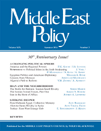
MIDDLE EAST POLICY
Scope & Guideline
Illuminating Critical Issues in Middle Eastern Studies
Introduction
Aims and Scopes
- Political Analysis and Governance:
The journal extensively covers political developments in the Middle East, analyzing governance structures, political transitions, and the role of various political entities, including state and non-state actors. - Conflict and Security Studies:
A core focus is placed on conflicts within and surrounding the Middle East, including analyses of military strategies, terrorism, insurgency, and the geopolitical implications of these conflicts. - International Relations and Foreign Policy:
The journal examines the foreign policies of Middle Eastern countries and their interactions with global powers, exploring themes such as diplomacy, alliances, and the impact of international agreements. - Socioeconomic Factors:
Research addressing the socioeconomic challenges faced by Middle Eastern nations, including issues of development, economic policy, and the impact of global economic trends on regional stability. - Cultural and Historical Perspectives:
The journal includes discussions on the historical context of current events and cultural dynamics, providing a comprehensive background to contemporary issues.
Trending and Emerging
- Great Power Competition:
There is an increasing focus on the influence of global powers such as the U.S., China, and Russia in the Middle East, particularly in relation to regional conflicts and alliances. This theme highlights the geopolitical shifts and the strategic interests of these powers. - Impact of Technology and Cybersecurity:
Emerging discussions around cybersecurity and the role of technology in conflicts have gained traction, illustrating the importance of digital warfare and information manipulation in modern geopolitical strategies. - Human Rights and Social Movements:
Recent titles indicate a rising interest in the analysis of human rights issues and social movements within the region, emphasizing the role of civil society in shaping political landscapes. - Economic Diversification and Development:
There is a noticeable trend towards exploring economic diversification strategies in Gulf states, particularly in the context of post-oil economies and sustainable development, reflecting the region's adaptive responses to global economic changes. - Regional Cooperation and Integration:
Research highlighting the potential for regional cooperation, especially in the context of security and economic partnerships, has become more prevalent, suggesting a shift towards collaborative approaches to shared challenges.
Declining or Waning
- Post-Arab Spring Analysis:
Initially, there was a surge in papers analyzing the outcomes and implications of the Arab Spring. However, the frequency of such analyses has diminished, possibly due to the stabilization of some regions and a shift in attention to other pressing issues. - Environmental and Climate Change Issues:
Despite the growing global concern about climate change, papers specifically addressing environmental issues in the Middle East have become less frequent, indicating a potential waning interest in this critical area. - Historical Conflicts and Resolutions:
The focus on long-standing historical conflicts, such as the Israeli-Palestinian conflict, appears to be less prevalent in recent issues, with fewer papers dedicated to historical resolutions or peace processes.
Similar Journals
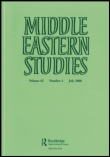
MIDDLE EASTERN STUDIES
Decoding the Dynamics of the Middle EastMIDDLE EASTERN STUDIES is a prestigious journal published by Routledge Journals, Taylor & Francis Ltd, focusing on the multidisciplinary examination of the Middle East from historical, cultural, geographical, sociopolitical, and developmental perspectives. With a convergence of research spanning over six decades (1964-2024), this journal seeks to present innovative scholarship that deepens the understanding of Middle Eastern dynamics, making it a vital resource for researchers, professionals, and students alike. It holds notable recognition in various academic fields, evidenced by its Q2 ranking in Cultural Studies and Q1 in History as of 2023, demonstrating its impact and relevance. Although it operates under a traditional subscription model, MIDDLE EASTERN STUDIES remains committed to enhancing academic discussions and fostering knowledge exchange within the international research community. As a trusted source for empirical studies and theoretical frameworks, this journal plays a crucial role in illuminating the complexities of the region and its global interactions.
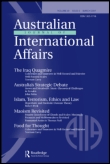
AUSTRALIAN JOURNAL OF INTERNATIONAL AFFAIRS
Bridging theory and practice in political science.Australian Journal of International Affairs is a prestigious academic journal dedicated to advancing the field of international relations and political science. Published by Routledge Journals, Taylor & Francis Ltd, the journal has established itself as a vital resource for researchers and practitioners alike, providing critical analyses and insights into the dynamic interplay between global politics, geography, and development. With an impressive Q1 ranking in Political Science and International Relations and a Q2 ranking in Geography, Planning and Development, the journal consistently features high-quality research, making it a crucial platform for scholarly discourse. The journal is accessible through various avenues, ensuring that its impactful contributions reach a wide audience. Emphasizing interdisciplinary approaches, the Australian Journal of International Affairs seeks to foster a deeper understanding of contemporary international challenges and promote innovative solutions through rigorous scholarship.

SIYASAL-Journal of Political Sciences
Bridging Perspectives in International RelationsSIYASAL-Journal of Political Sciences, published by ISTANBUL UNIVERSITY, stands at the forefront of research in the field of political science. Recognized for its commitment to open access publishing since 2017, this journal facilitates the dissemination of high-quality scholarly articles that address emerging trends and critical issues in political theory, comparative politics, and international relations. With a growing readership worldwide, SIYASAL aims to foster inclusive discourse and stimulate academic collaboration among researchers, professionals, and students alike. The journal's innovative approach and rigorous peer-review process ensure that it remains a valuable resource for those seeking to deepen their understanding of contemporary political dynamics. Housed in the vibrant academic environment of Istanbul, it serves not only as a platform for original research but also as a space for intellectual exchange and the exploration of diverse political perspectives.

Korea Observer
Fostering Scholarly Dialogue on Korea's Global InfluenceKorea Observer, published by the Institute of Korean Studies, is a leading academic journal that provides a critical platform for the exploration and discussion of various aspects of Korean studies. With an ISSN of 0023-3919, this journal has been an invaluable resource for researchers, professionals, and students interested in the social sciences and humanities pertaining to Korea, maintaining a consistent publication record from 2007 to 2024. As of 2023, it holds a respectable Q3 category ranking in both the Arts and Humanities and Social Sciences fields, showcasing its ongoing commitment to excellence in scholarly communication. While the journal primarily focuses on advancing the understanding of Korean culture, society, and politics, it also serves as a vital conduit for interdisciplinary insights that resonate with global academic discourses. Located in South Korea, this journal does not currently offer open access, making it essential for subscribers and institutional access for the latest research and discussions in the field. With a Scopus rank placing it favorably within its categories, the Korea Observer remains an essential tool for enriching the body of knowledge surrounding Korea and its global impact.

Chinese Political Science Review
Bridging local insights with global perspectives in political science.Chinese Political Science Review, published by Springer Singapore PTE Ltd, is a premier academic journal dedicated to advancing the study of political science, with a special emphasis on the socio-political dynamics of China and its international implications. With an ISSN of 2365-4244 and an E-ISSN of 2365-4252, this journal has established itself as a vital resource in the field, categorically recognized within the Q1 quartile for both Political Science and International Relations, as well as Sociology and Political Science in 2023. Holding an impressive Scopus ranking of #55 out of 706 in Political Science and #176 out of 1466 in Sociology, it represents the top 8% and 13% of its respective fields. The journal features rigorous peer-reviewed articles that aim to foster critical discourse and scholarly exchange, making it an indispensable platform for researchers, professionals, and students engaged in the exploration of contemporary political issues and trends. Although available in print and online formats, the journal prioritizes accessibility to its extensive body of research produced from 2016 to 2024, solidifying its status as a leading outlet for innovative political science scholarship.
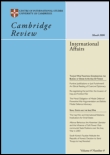
Cambridge Review of International Affairs
Fostering Critical Perspectives on Global ChallengesCambridge Review of International Affairs, published by Routledge Journals, Taylor & Francis Ltd, stands as a leading platform for scholarly discourse in the fields of Political Science and International Relations. Operating since 1986, this prestigious journal has firmly established itself in the academic community, evidenced by its commendable Q1 ranking and notable position in the 83rd percentile among Social Sciences journals according to Scopus rankings. With a commitment to exploring pressing global issues, the journal delivers rigorous analyses and diverse perspectives, making it an essential resource for researchers, practitioners, and students who strive to deepen their understanding of international affairs. Although the journal is not an Open Access publication, it ensures broad accessibility to its influential research, contributing significantly to the ongoing discourse in international relations until 2024 and beyond.
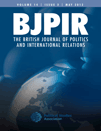
British Journal of Politics & International Relations
Fostering innovative research in politics and international affairs.The British Journal of Politics & International Relations, published by SAGE Publications Inc, serves as a vital platform for scholarly discourse in the fields of political science and international relations. With an impressive impact factor and a Scopus rank of #64 out of 706 in Political Science, this journal is recognized for its rigorous, peer-reviewed articles that contribute significantly to academic knowledge and policy discussion. With a focused scope that spans both theoretical and empirical research, the journal holds a prestigious Q1 ranking in Political Science and International Relations, as well as a Q2 designation in Management, Monitoring, Policy, and Law. Established in 2005, it has emerged as an essential resource for researchers, professionals, and students alike, engaging with contemporary challenges and fostering critical analyses. Access options are available through institutional subscriptions, ensuring wide availability for those seeking to enrich their understanding of the complex interplay between politics and international dynamics.
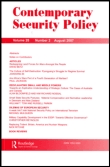
Contemporary Security Policy
Innovating Solutions for Contemporary Security ChallengesContemporary Security Policy is a leading academic journal published by Routledge Journals, Taylor & Francis Ltd, specializing in the fields of Political Science and International Relations. Since its inception in 1994, this prestigious journal has provided a platform for innovative research and critical discourse, reflecting on current security issues that shape global politics. With an impressive impact factor, and ranked in the Q1 category for its field in 2023, it stands as a crucial resource for scholars and practitioners alike, boasting a remarkable position in the 99th percentile of Scopus' Political Science rankings. Though it does not offer open access, the journal's extensive scope covers diverse topics related to contemporary security challenges, enhancing its relevance in today's dynamic geopolitical landscape. The journal is based in the United Kingdom and continues to be at the forefront of advancing knowledge and understanding in security policy over its converged years from 1994 to 2024.
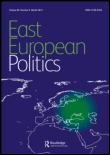
East European Politics
Fostering Discourse on Contemporary Political IssuesEast European Politics, published by ROUTLEDGE JOURNALS, TAYLOR & FRANCIS LTD, is a premier academic journal that plays a pivotal role in advancing the understanding of the socio-political dynamics within East Europe. Established in 2012 and spanning through 2024, this journal is renowned for its rigorous scholarship, achieving a distinguished Q1 ranking in key categories including Development, Geography, Planning and Development, and Political Science and International Relations for 2023. With an impressive Scopus rank placing it in the top 5% within the fields of Political Science and International Relations, East European Politics serves as an essential resource for researchers, professionals, and students seeking to engage with contemporary political issues and development challenges in the region. The journal does not offer open access at this time, but maintains a rich archive of high-quality articles that contribute significantly to scholarly discourse and policy analysis. This vital platform not only disseminates current research but also fosters a deeper understanding of the historical and cultural contexts that shape the political landscapes of East Europe.
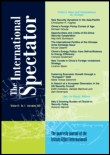
International Spectator
Shaping Perspectives on International Relations.International Spectator, published by Routledge Journals, Taylor & Francis Ltd, stands as an eminent peer-reviewed journal in the field of Political Science and International Relations. Established in 1983 and continuing its impactful discourse through 2024, the journal boasts a commendable Q1 ranking in 2023, confirming its position among the top-tier journals within its discipline. With a Scopus ranking of 121 out of 706, it lies in the 82nd percentile, showcasing the robustness of its scholarly contributions. Although not designated as an open-access journal, International Spectator remains essential reading for researchers, professionals, and students seeking to navigate the complexities of international politics. The journal aims to publish high-quality research that engages with global political dynamics, providing a platform for innovative ideas and critical analyses that shape the understanding of international relations today.